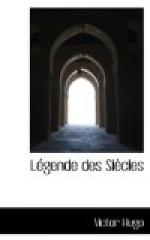C’etait l’heure ou sortaient les chevaux du soleil; Le ciel tout fremissant du glorieux reveil, Ouvrant les deux battants de sa porte sonore, Blancs, ils apparaissaient formidables d’aurore; Derriere eux, comme un orbe effrayant, couvert d’yeux, Eclatait la rondeur du char radieux * * * * * Les quatre ardents chevaux dressaient leur poitrail d’or; Faisant leurs premiers pas, ils se cabraient encor Entre la zone obscure et la zone enflammee; De leurs crins, d’ou semblait sortir une fumee De perles, de saphirs, d’onyx, de diamants, Dispersee et fuyante au fond des elements, Les trois premiers, l’oeil fier, la narine embrasee, Secouaient dans le jour des gouttes de rosee; Le dernier secouait des astres dans la nuit.
In La Confiance du Marquis Fabrice light and shadow are very skilfully managed. We see the little princess Isora making her toilet in the early morning, when everything is fresh and bright. It is in the dawn that she loves to play. But the banquet of death takes place at night in a dimly lighted hall, when the lack of clear light adds to the horror of the scene. Note the Rembrandtesque effects in such phrases: ’aux tremblantes clartes,’ ‘l’ombre indistincte,’ ’a travers l’ombre, on voit toutes les soifs infames,’ and it ends in ‘le triomphe de l’ombre,’ a phrase in which the literal and the figurative are subtly blended together. On the other hand, how everything sparkles and gleams in Le Mariage de Roland! Olivier’s sword-point glitters like the eye of a demon, while Durandal shines as he falls on his foeman’s head; the sunshine is all round them in the day, and the night passes quickly; sparks fly from the weapons as they strike one another, and light up the very shadows with a dull flash. Take again La Rose de l’Infante. Everything round the little princess is bright: ‘le profond jardin rayonnant et fleuri,’ ’un grand palais comme au fond d’une gloire,’ ‘de clairs viviers,’ ’des paons etoiles.’ The very grass, too, seems to sparkle with diamonds and rubies. But Philip is a dark shadow, half hidden in mist:
On voit d’en bas une ombre, au fond
d’une vapeur,
De fenetre a fenetre errer, et l’on
a peur.
He is always dressed in black:
Toujours vetu de noir, ce tout-puissant
terrestre
Avait l’air d’etre en deuil
de ce qu’il existait.
No light is ever seen in his palaces:
L’Escurial, Burgos, Aranjuez, ses
repaires,
Jamais n’illuminaient leurs livides
plafonds.
His eye shines, it is true, but it is a gleam that suggests a darkness beneath:
Sa prunelle
Luit comme un soupirail de caverne.
Note again the oppressive darkness of the opening lines of Pleine Mer, in which the only touch of light is the winding-sheet of the waves, and contrast it with the atmosphere of light which surrounds the ship in Plein Ciel, where even the night is bright:




